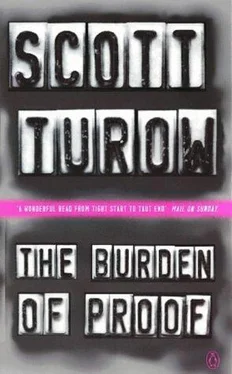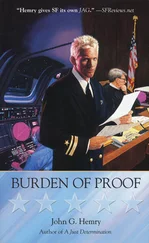Scott Turow - The Burden of Proof
Здесь есть возможность читать онлайн «Scott Turow - The Burden of Proof» весь текст электронной книги совершенно бесплатно (целиком полную версию без сокращений). В некоторых случаях можно слушать аудио, скачать через торрент в формате fb2 и присутствует краткое содержание. Жанр: Детектив, на английском языке. Описание произведения, (предисловие) а так же отзывы посетителей доступны на портале библиотеки ЛибКат.
- Название:The Burden of Proof
- Автор:
- Жанр:
- Год:неизвестен
- ISBN:нет данных
- Рейтинг книги:3 / 5. Голосов: 1
-
Избранное:Добавить в избранное
- Отзывы:
-
Ваша оценка:
- 60
- 1
- 2
- 3
- 4
- 5
The Burden of Proof: краткое содержание, описание и аннотация
Предлагаем к чтению аннотацию, описание, краткое содержание или предисловие (зависит от того, что написал сам автор книги «The Burden of Proof»). Если вы не нашли необходимую информацию о книге — напишите в комментариях, мы постараемся отыскать её.
The Burden of Proof — читать онлайн бесплатно полную книгу (весь текст) целиком
Ниже представлен текст книги, разбитый по страницам. Система сохранения места последней прочитанной страницы, позволяет с удобством читать онлайн бесплатно книгу «The Burden of Proof», без необходимости каждый раз заново искать на чём Вы остановились. Поставьте закладку, и сможете в любой момент перейти на страницу, на которой закончили чтение.
Интервал:
Закладка:
Scott Turow
The Burden of Proof
[Our] decisions have respected the private realm of family life which the state cannot enter.
Prince v. Massachusetts, 321 U.S. 158, 166 (1944), an opinion of the United States Supreme Court I once undertook to improve the marriage relations of a very intelligent man… He continually occupied himself with the thought of a separation, which he repeatedly rejected because he dearly loved his two small children…
One day, the man related to me a slight occurrence which had extremely frightened him. He was sporting with the older child, by far his favorite. He tossed it high in the air and repeated this tossing until finally he thrust it so high that its head almost struck the massive gas chandelier… [The child] became dizzy with fright… The particular facility of this careless movement… suggested to me to look upon this accident as a symbolic action…
There was indeed a powerful determinant in a memory from the patient's childhood: it referred to the death of a little brother, which the mother laid to the father's negligence, and which led to serious quarrels with threats of separation between the parents. The continued course of my patient's life, as well as the therapeutic success, confirmed my analysis.
SIGMUND FREUD, The Psychopathology of Everyday LifePART ONE
They had been married for thirty-one years, and the following spring, full of resolve and a measure of hope, he would marry again. But that day, on a late afternoon near the end of March, Mr. Alejandro Stern had returned home and, with his attache case and garment bag still in hand, called out somewhat absently from the front entry for Clam, his wife. He was fifty-six years old, stout and' bald, and never particularly good-looking, and he found himself in a mood of intense preoccupation.
For two days he had been in Chicago that city of rough souls on behalf of his most difficult client. Dixon Hartnell was callous, self-centered, and generally full of his lawyers' advice; worst of all, representing him was a permanent engagement. Dixon was Stern's brother-in-law, married to Silvia, his sister, Stern's sole living immediate relation and the enduring object of his affections. For Dixon, of course, his feelings were hardly as pure. In the early years, when Stern's practice mounted to little more than the decorous hustling of clients in the hallways of the misdemeanor courts, serving Dixon's unpredictable needs had paid Stern's rent. Now it was one of those imponderable duties, darkly rooted in the hard soil of Stern's own sense of filial and professional obligation.
It was also steady work. The proprietor of a vast commodity-futures trading empire, a brokerage house he had named, in youth, Maison Dixon, and a series of interlocked subsidiaries, all called MD-this and -that, Dixon was routinely in trouble. Exchange officials, federal regulators, the IRS-they'd all had Dixon's number for years. Stern stood up for him in these scrapes.
But the present order of business was of greater concern. A federal grand jury sitting here in Kindle County had been issuing subpoenas out of town to select MD clients. Word of these subpoenas, served by the usual grim-faced minions of the FBI, had been trailing back to MD for a week now, and Stern, at the conclusion of his most recent trial, had flown at once to Chicago to meet privately with the attorneys representing two of these customers to review the records the government required from them. The lawyers reported that the Assistant United States Attorney assigned to the matter, a young woman named Klonsky, declined to say precisely who was under suspicion, beyond exonerating the customers themselves. But to a practiced eye, this all had an ominous look. The out-of-town subpoenas reflected a contemplated effort at secrecy. The investigators knew what they were seeking and seemed intent on quietly encircling Dixon, or his companies, or someone close to him.
So Stern stood travel-weary and vexed in the slate foyer of the home where Clara and he had lived for nearly two decades. And yet, what was it that wrested his attention so thoroughly, so suddenly? The silence, he would always say.
Not a tap running, a radio mumbling, not one of the household machines in operation. An isolated man, he drew, always, a certain comfort from stillness. But this was not the silence of rest or interruption. He left his bags on the black tiles and stepped smartly through the foyer.
"Clara?" he called again.
He found her in the garage. When he opened the door, the odor of putrefaction overwhelmed him, a powerful high sour smell which dizzied him with the first breath and drove up sickness like a fist. The car, a black Seville, the current model, had been backed in; the driver's door was open. The auto's white dome light remained on, so that in the dark garage she was warmly spotlit. From the doorway he could see her leg extended toward the concrete floor, and the hem of a bright floral shirtwaist dress. He could tell from the glint that she was wearing hosiery.
Slowly, he stepped down. The heat in the garage and the smell which increased revoltingly with each step were overpowering, and in the dark his fear left him weak. When he could see her through the open door of the car, he advanced no farther. She was reclined on the camel-colored leather of the front seat. Her skin, which he noticed first, was burnished with an unnatural peachish glow, and her eyes were closed. It seemed she had meant to appear neat and composed. Her left hand, faultlessly manicured, was placed almost ceremonially across her abdomen, and the flesh had swollen slightly beneath her wedding rings.
She had brought nothing with her. No jacket. No purse. And she had not fallen back completely; her other arm was rigidly extended toward the wheel, and her head was pinned against the seat at a hopeless, impossible angle. Her mouth was open, her tongue extruded, her face dead, motionless, absolutely still. In the whitewashed laundry room adjoining the garage he was immediately sick in one of the porcelain basins, and he washed away all traces before calling in quick order 911 and then his son.
"You must come straightaway," he said to Peter. He had found him at home. "Straightaway." As usual in stress, he heard some faint accentuation of the persistent Hispanic traces in his speech; the accent was always there, an enduring deficit as he thought of it, like a limp:
"Something is wrong with Mother," Peter said. Stern had mentioned nothing like that, but his son's feeling for these things was sure.
"What happened in Chicago?"
When Stern answered that she had not been with him, Peter, true to his first instincts, began to quarrel.
"How could she not be with you? I spoke to her the morning you were leaving."
A shot of terrible sympathy for himself tore through Stern.
He was lost, the emotional pathways hopelessly tangled.
Hours later, toward morning, as he was sitting alone beneath a single light, sipping sherry as he revisited, reparsed every solemn moment of the day, he would take in the full significance of Peter's remark. But that eluded him now. He felt only, as ever, a deep central impatience with his son, a suffering, suppressed volcanic force, while somewhere else his heart read the first clues in what Peter had told him, and a sickening unspeakable chasm of regret began to open.
"You must come now, Peter. I have no idea precisely what has occurred.
I believe, Peter, that your mother is dead."
His son, a man of thirty, let forth a brief high sound, a cry full of desolation. "You believe it?"
"Please, Peter. I require your assistance. This is a terrible moment.
Come ahead. You may interrogate me later." 'For Chrissake, what in the hell is happening there? What in the hell is this? Where are you?"
Читать дальшеИнтервал:
Закладка:
Похожие книги на «The Burden of Proof»
Представляем Вашему вниманию похожие книги на «The Burden of Proof» списком для выбора. Мы отобрали схожую по названию и смыслу литературу в надежде предоставить читателям больше вариантов отыскать новые, интересные, ещё непрочитанные произведения.
Обсуждение, отзывы о книге «The Burden of Proof» и просто собственные мнения читателей. Оставьте ваши комментарии, напишите, что Вы думаете о произведении, его смысле или главных героях. Укажите что конкретно понравилось, а что нет, и почему Вы так считаете.












